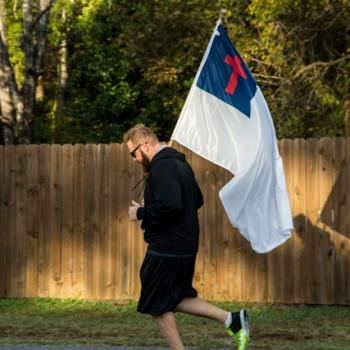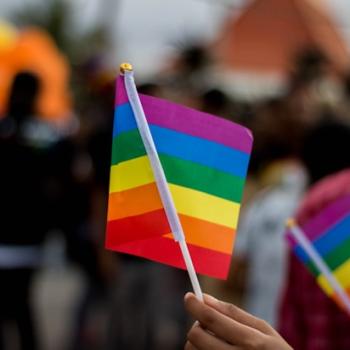Harvard Magazine recently published a piece by Erin O’Donnell titled The Risks of Homeschooling, wherein she focuses largely upon the apparent risks associated with those who choose to keep their children out of the public school system and homeschool instead. Ms. O’Donnell largely regurgitates the arguments of Elizabeth Bartholet, so she will bear the focus of my response here. The piece itself contains a corresponding illustration depicting a child locked inside a house with bars on the windows, staring longingly at the various children playing outdoors. The child, of course, is white—that comes up a bit later in the piece itself as one of the motivations why one might homeschool, yet another tell-tale sign of where the piece is headed are the various subjects listed on the side of the house (in book form, no less). Alongside various subjects plastered on the side of the “jailhouse” homeschool residence is the word “Bible”, squarely aimed at conservative Christians. It is interesting to note that the original graphic which misspelled arithmetic—a mistake many a homeschooled child was quick to point out—was quietly removed and replaced, but I digress.
I want to make clear at the outset that I believe myself to be in a privileged position to offer a substantial critique to this, namely because I both work in the public school system and have decided to homeschool my children. The decision to keep our children at home for the duration of their education was made long before I worked within the school system, but my experience has only solidified this decision one-hundred fold since then based on certain factors. Many of those factors are personal convictions on the nature of public education, yet many more are based on a deep commitment to Christian values. Both my wife and I grew up in the public school system and while she grew up in a conservative Christian home, I did not. I received the full secular experience, even embracing a strong anti-theism, only to inevitably come to faith later in life at the age of 21. In all of this, I believe I am perhaps more qualified in the eyes of liberally-minded individuals to make comments on an article such as Elizabeth Bartholet’s, namely, because I was one for a great portion of my life.
The reality I see as both a public school employee and a homeschooling parent is that the public school system is essentially an unsustainable model that seeks to indoctrinate any who walk within their doors of the pleasantries of liberalism. In other words, what Elizabeth Bartholet believes is a bastion of Democracy is little more than an incredible echo chamber for narrow-minded liberals who wish to train the next generation of secularist neophytes. What she sees as a “meaningful education,” I see, as clearly as day an entity that struggles to maintain test scores, create meaningful academic benchmarks, and meet individualized learning styles with students. Instead, the public school system often uses buzzwords to highlight their educational goals, knowing full-well that when the numbers come in, things can be spun from a slightly different angle for the stakeholders (which we are led to believe are the tax payers). Of course, I am speaking broadly here—focusing on a national level rather than in the granular details of each and every district and municipality. There are always exceptions to the rule, such as small-town districts or districts in areas with a higher prevalence of Christians than non-Christians. The point I am drawing to, however, is what comes from the top down, meaning specifically the Department of Education, and subsequently, the State Board of Education.
One of the disparities she fails to mention that I find quite interesting is the high percentage of low-income families that do not choose to homeschool and the correlation these households have in being single-parent families. The results have long been in that homes with both a mom and dad tend to produce more well-rounded children than homes that do not. Now, this is obviously not always the case, but there is also a direct correlation between low-income families and behavioral-emotional issues. There are many reasons for this and I do not wish to paint as broad a brushstroke as Elizabeth Bartholet does, but it remains an indisputable fact that there are higher percentages of low-income families with children who come into the public school system with an I.E.P. (Individualized Educational Plan). Often times, the households of these children can be fraught with problems within the home, meaning more specifically that the schools are looked at as the means of raising your children, rather than the parent taking an active role in their own child’s life and education. This is obviously not so with homeschoolers, yet I digress again, as the focus is on the demographics of students with behavioral issues, who then subsequently have behavioral issues in school. These things naturally affect the child’s learning and school environment, yet also, the learning and environment of other children within the building they are peers with.
This is one of the reasons why lawmakers have been working on various models of targeted assistance when it comes to general school funding, which is an ever-changing beast. Some of the children targeted by federal tax dollars are learning disabled, meaning specifically that they have physical and mental disabilities that prevent them from learning in the same way and at the same rate as their peers. However, a rather large group of these are made up of I.E.P.’s which are designated as social and emotional disorders. Regardless of how one stretches it though, the basic structure of these funding models is to give equitable education to students, which invariably means more educational time and money is given to students who have higher educational needs. Again, this tends to be students who fall within the federal poverty range, and those who have specified learning disabilities, including but not limited to those with social and emotional disorders.
Students are given an I.E.P. for various reasons and placed on a scale based on the severity of their struggles. The annual measures of success are equally as wide-ranging as the classifications, yet the point that I wish to draw out is that the percentages of students falling under the auspices of special education have only increased over the years. Germane to our discussion here, under the IDEA grant, the disability “emotional disturbance” is the 4th largest disability category. Schools are continuing to have a greater demand to hire behavioral interventionists, guidance counselors, school psychologists, therapists, and the like, which is becoming increasingly difficult for districts to find qualified candidates due to nationwide teacher shortages. What’s more than this is that this is not confined to high school districts, but elementary districts as well.
What that means is that the public school system is not only facing an issue of an increase in students with social and emotional issues, but children with these issues are getting younger and younger. Furthermore, these students are often not being met with highly qualified staff who are best equipped, per the State’s own standards, to facilitate adequate learning and address the students so they meet their behavioral goals. To put it in the simplest of terms, we are seeing more students than ever who are depressed and dealing with anxiety problems, even at ages where one would think a child wouldn’t face such complex issues, and often-times, they are being met with people who are unqualified to handle them, and therefore, unable to help them meet behavioral goals.
The reasons students come into the public school system with such issues are complex, even if one were to only look at the social and emotional disabilities on the spectrum of special education. Suffice it to say though, this is not broached in any respect in the Harvard puff piece on homeschooling. My suspicions as to why would simply be that Elizabeth Bartholet likely believes that the public school system is in no way culpable in any respect, despite the fact that many a secularist publication has drawn the correlation between public school and prisons. My own sentiments are that this is only exacerbated when it comes to exposing children to the complex moral issues of our culture, and it is little wonder that children, ill-equipped to think through such issues critically, have no idea how to handle these issues adequately. They are, at the behest of a secularizing culture, thrown into the deep waters of ethical issues most adults fail to navigate all that well.
Bartholet also makes some assertions regarding the status of school employees as mandated reporters, which is true enough, yet she makes no peep at the rising rates of sexual abuse from teachers, nor how prevalent sexual harassment in schools is. There is a valid point to made with abusive parents who might decide to homeschool their children. However, the fundamental problem is not with homeschooling, per se, but the abusive parent and the court system that lets them off the hook. When we get down to it, this isn’t her main issue with homeschooling; rather, it serves as a leaping-point to demonstrate another type of [sic] abusive behavior she believes is the real threat to Democracy: “…the absence of regulations ensuring that homeschooled children receive a meaningful education equivalent to that required in public schools…” In other words, the issue for Elizabeth Batholet is about control, namely, control over the content of what’s being taught. This is revealed more clearly as she is afterward quoted saying, “I think it’s always dangerous to put powerful people in charge of the powerless, and to give the powerful ones total authority.” Note how it is the parents who are considered authoritarian, not the educational system, even though the goal is to have blanket authority within the homeschooling realm.
Interestingly enough, despite Bartholet’s numerous fallacious assertions, homeschool children, regardless of poverty levels, continue to test higher, sleep better at night, and turn out to be perfectly well-rounded people with adequate social skills. Others in the secular world also see the benefits for homeschooling when it comes to teens dealing with anxiety, becoming generally successful adults, and even removing their children from environments where bullies are not being punished in any substantive ways (largely because the operative philosophy in schools is that bullies won’t learn through punishment, which is a folly all of its own).
I could go on about many of the benefits to homeschooling that might speak more to the world of someone like Elizabeth Bartholet, but I’d rather focus on my own personal reasons for why my wife and I chose to homeschool our children; and no, it isn’t because we want to [sic] “…question science and promote female subservience and white supremacy.” We chose to homeschool because we fundamentally believe the public school system, as a whole, is abysmal, opposed to our Christian convictions, and churns out unbelieving adults more than any other institution—not for intellectual reasons, but for reasons that have become abundantly clear through publications such as Bartholet’s.
In other words, we believe that we cannot only give our children a much better education than the public school system can, but we can give our children a better childhood, maintain our convictions, and prepare them for the real world after having been equipped to contend for the Christian faith. I believe that Christians will only continue to be mocked, ridiculed, and slandered, and so I am raising my children appropriately to handle such things. A case in point being that on occasion, some of the detractors on this blog have been highlighted not only to show various logical fallacies, but antagonistic behavior towards Christian ideals. Yet I am not so naive as to think that it is merely a problem in adolescence, as perhaps at the collegiate level, there is more of a battle over a young person’s faith than many are even aware of.
In the academic world, there is no such tolerance given to those with conservative values. This has been manifestly clear to anyone who has cared to pay even a modicum of attention to what’s been going on. There is nothing but a blatant sanction of pluralism, sexual anarchy, and liberalism, and you and I both know it full well. Any teachers who have dared to speak against homosexuality and transgenderism as normative, ethical behavior have not only lost tenure, but been blacklisted from higher education. Students are mocked in front of peers by professors simply for holding conservative values. Many are not actually given any freedom to think for themselves; they must adopt the group think of the day, including the jargon of one’s preferred pronouns, the sexual licentiousness that is our culture, and the general anti-family, anti-child, and anti-God mindset that pervades these institutions. Yet this doesn’t stop at higher education. It has trickled down for years into virtually every sphere of influence within high school and elementary education.
To put it more bluntly, the educational model of the United States is fundamentally at odds with the Christian worldview simply by virtue of the assertion that it is value-neutral. What I mean by this is that quite plainly, nothing is neutral. Nothing is benign. Those who claim any sort of fidelity to the Scriptures ought to see this fairly clearly, as you essentially have two opposing systems of belief in this world: that which comports with the truth of our Creator, or that which comports with the system of beliefs this world holds dear, which rejects its Creator. Part and parcel to these beliefs embraced by the broader culture is the blatant sexualization of children. Lest we forget, Teen Vogue published a rather detailed article for their young readership, expressing the [sic] perfectly healthy and natural expression of sodomy. One need not get too deep into the waters before they find examples of drag-queen story-time being brought to schools, kindergartners needing to be taught on gender identity, and of course, teaching the littlest ones on the secular model of sexual education.
Of course, the problem extends into the broader culture as well. I cannot tell you how many times I’ve gone with my wife to buy clothes for our daughters at the store, only to find low-cut shirts for pre-pubescent girls, and return home empty-handed. It is utterly maddening and revolting. To be clear, I agree with Bartholet about one thing: I am certainly driven by my, “…conservative Christian beliefs, and seek[ing] to remove [my] children from mainstream culture.” I have no desire to have my children turn out like most of the children in my country. That is to say: I desire my children to be distinctly Christian when they are adults, therefore, everything I do with them will be toward that aim. This is not to say homeschool is a one-size fits all, end-all-be-all that guarantees Christian children or to say all who choose another route are destined to fail in child-rearing, but it is to say there is a correlation between the public school system and the liberalization of America.
This is, in a nutshell, why we homeschool. Not only do we have the freedom to teach our children, but we are able to fulfill our God-given role to teach them the deep truths about God. I have no qualms stating I have an agenda with homeschooling, and that agenda is to proselytize my children. When all is said and done, I desire to raise God-fearing kids. If they don’t fit in with the general society, I honestly feel I will have done my job well. My goal is not to raise obedient pagans, but children who will be on mission for Christ. My goal is to raise daughters who won’t kill their babies, like our culture loves to do, but will care for them and their families. My goal is to raise them as women who will, “…love their husbands and children, to be self-controlled, pure, working at home, kind, and submissive to their own husbands, that the word of God may not be reviled” (Tit. 2:3-5). My goal is to raise a son who will love his wife well, which in particular looks like dying to his own will and submitting to Christ’s lead, so that his family will thrive. My goal is to raise him so that he cherishes, respects, and loves his wife, “…as Christ loved the church and gave Himself up for her, that He might sanctify her, having cleansed her by the washing of water with the word, so that he might present the church to Himself in splendor, without spot or wrinkle or any such thing, that she might be holy and without blemish” (Eph. 5:25-27).
In other words, I’d rather raise three, biblically-minded children who are esteemed in the sight of the Lord, than children who are successful and well-rounded in the eyes of a person like Elizabeth Bartholet. I make no secrets about that, nor the fact that there is literally nothing I want a godless school system guiding my child in. This is not to say all school teachers and other employees are godless (that would indict me as well). There are some extremely godly people within the school system, but they are few and far between, as the schools are predominately liberal. However, it is to say, unequivocally, that as a whole I believe the school system is fundamentally abysmal. I see it firsthand with what comes down from the Federal and State level and gets mandated in Districts. I work in the public school system and my wife and I still choose to homeschool our three kids, even as products of the public school system. That should tell you something…













